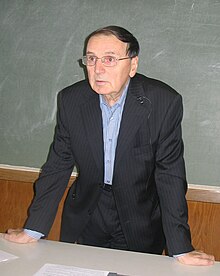You can help expand this article with text translated from the corresponding articles in Russian and Belarusian (Taraškievica orthography). (August 2024) Click for important translation instructions.
|
| This article needs additional citations for verification. Please help improve this article by adding citations to reliable sources. Unsourced material may be challenged and removed. Find sources: "Andrey Zaliznyak" – news · newspapers · books · scholar · JSTOR (August 2024) (Learn how and when to remove this message) |
| Andrey Zaliznyak | |
|---|---|
| Андрей Зализняк | |
 Zaliznyak in 2008 Zaliznyak in 2008 | |
| Born | (1935-04-29)29 April 1935 Moscow, Soviet Union |
| Died | 24 December 2017(2017-12-24) (aged 82) Moscow, Russia |
| Nationality | Soviet Russian, Russian |
| Alma mater | Faculty of Philology of Moscow State University, Sorbonne |
| Scientific career | |
| Fields | |
| Doctoral advisor | Vyacheslav Ivanov, André Martinet |
Andrey Anatolyevich Zaliznyak (Russian: Андре́й Анато́льевич Зализня́к, IPA: [zəlʲɪˈzʲnʲak]; 29 April 1935 – 24 December 2017) was a Soviet and Russian linguist, an expert in historical linguistics, accentology, dialectology and grammar. Doctor of Philological Sciences (1965, while defending his Candidate thesis). In his later years he paid much attention to the popularization of linguistics and the struggle against pseudoscience.
Biography
Zaliznyak was born in Moscow and studied in the Moscow University before moving to the Sorbonne to further his studies with André Martinet. He was married to the linguist Elena V. Paducheva, with whom he also co-authored scientific publications. He was admitted into the Soviet Academy of Sciences as a corresponding member in 1987. Ten years later, he was elected a full academician.
Zaliznyak's first monograph, Russian Nominal Inflection (1967), remains a definitive study in the field. Ten years later, he published a highly authoritative Grammatical Dictionary of the Russian Language, which went through several reprints and provided a basis for Russian grammar software.
In 1982, Zaliznyak turned his interests towards the birch bark scrolls which have been unearthed in Novgorod since the 1950s. He has co-edited all publications of newly discovered birch scrolls since 1986. As the number of these ancient documents exceeded 700, Zaliznyak summed up his findings in the monograph Old Novgorod dialect (1995), which comprised the texts and comments of every birch scroll discovered. In particular, he demonstrated how the phonetics of the Old Novgorod dialect can be reconstructed from the typos in the birch scrolls.
In 2003, Zaliznyak published the first comprehensive study of the Novgorod Codex, the earliest extant East Slavic book, which had been sensationally discovered three years earlier.
In 2004, he published a study of The Tale of Igor's Campaign which examined all the significant linguistic arguments concerning its authenticity. Zaliznyak contends that no 20th-century (let alone 18th-century) forger could have reproduced the grammatical subtleties of the 12th-century Old East Slavic language.
Zaliznyak lectured in the Moscow University, University of Geneva, and University of Paris. For more data on his work, see Old Novgorod dialect, Novgorod Codex, and The Tale of Igor's Campaign.
Honors
- 1997: Demidov Prize
- 2007: State Prize of the Russian Federation
- 2007: Solzhenitsyn Prize
- 2007: Lomonosov Gold Medal
- 2015: Shakhmatov Prize [ru], for his work, Древнерусское ударение: общие сведения и словарь
Major works
- Andrey Zaliznyak. Russkoe imennoe slovoizmenenie. Moskva, 1967.
- Andrey Zaliznyak. Grammaticheskij slovar' russkogo jazyka. Moskva, 1977, (further editions are 1980, 1987, 2003).
- Andrey Zaliznyak. Grammaticheskij ocherk sanskrita. Appendix to Russian-Sanscrit dictionnary, ed. by V.A. Kochergina, Moskva, 1978.
- Andrey Zaliznyak. Drevnenovgorodskij dialekt. Jazyki slavjanskoj kul'tury: Moskva. 2004.
- Andrey Zaliznyak. About Faux Linguistics and Quasihistory
References
- "К юбилею Андрея Анатольевича Зализняка",
- Iosad, Pavel; Koptjevskaya-Tamm, Maria; Piperski, Alexander; Sitchinava, Dmitri (2018). "Depth, brilliance, clarity: Andrey Anatolyevich Zaliznyak (1935–2017)". Linguistic Typology. 22: 175–184. doi:10.1515/lingty-2018-0006. hdl:20.500.11820/f89e174c-418b-4944-911b-ea8a0686615a. Retrieved 13 January 2024.
- Названы лауреаты Государственной премии РФ Kommersant 20 May 2008
- "О ложной лингвистике и квазиистории" (retrieved October 14, 2015)
External links
- А. А. Зализняк на сайте Института славяноведения РАН
- Андрей Анатольевич Зализняк. Биографическая справка
- Pavel Iosad, Maria Koptjevskaja-Tamm, Alexander Piperski and Dmitri Sitchinava (2018) "Depth, brilliance, clarity: Andrey Anatolyevich Zaliznyak (1935–2017)" (Obituary). Linguistic Typology 2018; 22(1): 175–184.
- 1935 births
- 2017 deaths
- Writers from Moscow
- Russian people of Ukrainian descent
- Linguists of Slavic languages
- Linguists from Russia
- Linguists from the Soviet Union
- 20th-century linguists
- Grammarians from Russia
- Linguists of Russian
- 21st-century linguists
- University of Paris alumni
- Corresponding Members of the USSR Academy of Sciences
- Full Members of the Russian Academy of Sciences
- State Prize of the Russian Federation laureates
- Demidov Prize laureates
- Solzhenitsyn Prize winners
- Recipients of the Lomonosov Gold Medal
- Russian scientists